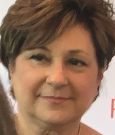After coping with breast cancer for more than a decade, it is difficult for me to put into words exactly how grateful I am to all the doctors, nurses, and researchers whose efforts have kept me alive for all these years. And not just alive, but thriving.
A routine mammogram had discovered two small tumors in my left breast, and a tissue biopsy confirmed stage I estrogen receptor–positive breast cancer. Even though the cancer was caught at such an early stage, and there was no evidence that it had spread, I wanted to have the best chance for a cure and opted for the most aggressive treatment my doctor offered: a contralateral prophylactic mastectomy followed by reconstructive breast surgery.
After my surgery, my oncologist gave me the Oncotype DX genomic test to score, on a scale of 0 to 100, how likely it was that my cancer would recur, so we could evaluate whether adjuvant chemotherapy would be beneficial. I scored a 1, indicating that my risk of recurrence was low and that the potential harms of chemotherapy outweighed the benefits. And just to be extra cautious, because I was 49 years old and had not yet gone through menopause, my oncologist advised 5 years of tamoxifen. Unfortunately, 4 years later, my cancer recurred in the same breast and had spread to my iliac bone. Now, I was facing stage IV disease and possibly death.
The Clinical Trial That Is Saving My Life
My initial diagnosis didn’t come as a surprise to me. Both my mother and younger sister had breast cancer, and I always felt it was inevitable that I would be next in line. But when the cancer recurred, after all the indications that it wouldn’t, I was devastated and concerned about having to go through additional surgery, plus chemotherapy and radiation therapy. Fortunately, before I had to make that decision, my oncologist told me about a new clinical trial investigating palbociclib (Ibrance), a CDK4/6 inhibitor, in combination with letrozole.
Even though I did not test positive for the BRCA gene mutation, as an extra precaution and to give myself the best shot at halting progression of my cancer, before I entered the trial, I decided to have my ovaries removed. After just 9 months of being on the combination therapy, all evidence of my cancer was gone. I have been in the trial for the past 6 years and remain cancer-free. My doctor has told me that as long as the treatment is effective for me, I will likely continue on it as maintenance therapy for the rest of my life.
Giving Back
I know that with cancer there is no guarantee remissions will last forever, especially when metastatic disease is involved, but I’m at peace. To be alive and living a full and satisfying life after a stage IV diagnosis is miraculous to me.
To express my appreciation to the oncology profession that has given me so much and to contribute to important new research in breast cancer, I am participating in the Share the Journey: Mind, Body, and Wellness After Breast Cancer clinical study (sharethejourneyapp.org) [see more about the Share the Journey app above]. The study is investigating the symptoms women face after breast cancer treatment and what can be done to improve them. I’m happy to offer details about my experience in the hope that they will provide researchers with the information needed to improve the lives of other women facing this disease.
Being an Active Participant in Cancer Care
Having lived with breast cancer for so many years has also taught me the valuable lesson of how crucial it is to be a full participant with my oncology team in my medical care, and it’s a message I repeat over and over to other cancer survivors I meet. As wonderful and capable as oncologists and nurses are, they can’t fight a patient’s cancer by themselves; they need the patient’s help.
If patients think they can fight cancer without being fully involved in their care, they are wrong. I have no doubt that the combination of having a wonderful oncology team providing me with the best medical guidance and being actively engaged in my treatment decisions has kept me alive for 10 years. And I fully expect it will keep me alive for many more. ■
Ms. Klein lives in Sherman Oaks, California.


